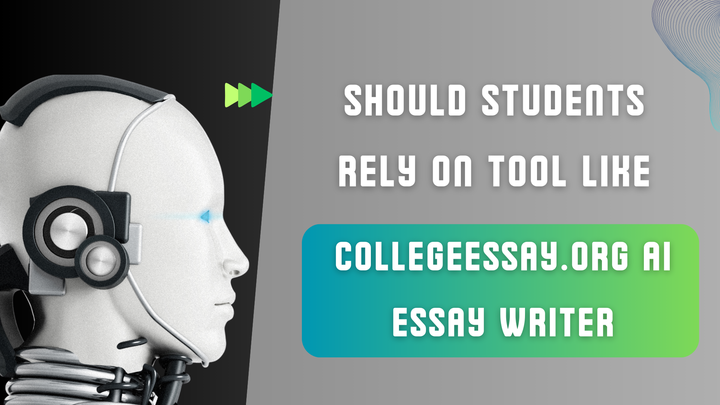Should Students Rely on Tool Like CollegeEssay.org AI Essay Writer?
Corps

Artificial intelligence is creating a wave in almost every industry; education is no exception. Students are looking out for better ways of improving their performance, and AI-powered tools have made their way to the limelight—for instance, CollegeEssay.org's AI Essay Writer.
This is one such handy tool that helps with writing assignments and offers unique benefits tailored to students' needs. But then, the question remains: Should students rely on such tools? Now, let us focus on the features and benefits of the AI Essay Writer from CollegeEssay.org.
What is CollegeEssay.org’s AI Essay Writer?
The essay writer by CollegeEssay.org is designed to assist students at various organizational levels of essays and to come up with essay content. It also checks the grammar and stylistic features of an essay; it can further research to ensure that the students work on quality academic materials.
Additionally, the AI tool can research to provide you with high-quality academic content. It searches through a vast database of resources, helping students incorporate relevant and credible information into their essays.
Moreover, the research capabilities of AI ensure that students are not just producing content but are doing so with substantiated and relevant information, elevating the overall quality of their essays.
Features:
Here are some key features of CollegeEssay.org’s AI Writer:
Essay Structuring: Helps students to create ideas and organize them for the best essay.
Content Generation: Provides prompts and suggestions based on user input, aiding students in generating relevant content and expanding their ideas.
Grammar and Style Checking: Ensures content is free from grammatical errors and improves the overall clarity and style of the writing.
Advanced Plagiarism Checker: Its advanced plagiarism checker rephrases paragraphs and provides unique content.
Support For Different Academic Levels
- High School
- College
- Master’s
- Doctoral
Benefits of Using AI Tool
Enhanced Learning Opportunities
AI provides real-time feedback that students may use to develop their work and learn from their mistakes. This tool can be attuned to support different styles of learning and needs.
Each one of these benefits alone has the potential to improve the learning experience and support achievement.
Time Management and Efficiency
AI reduces workload, and hence pressure of academic assignments, by automating some of the tasks. This AI tool assists in keeping tasks organized and work prioritized and thus helps manage one's time better.
Conclusion
The AI tools, including the CollegeEssay.org AI Writer, accrue useful benefits in education in the form of better learning opportunities and better time management. Nevertheless, they also introduce a host of ethical concerns related to academic integrity, development of skills, and accessibility.
Considering the advancements made in AI technology every day, it becomes very important for students, educators, and policy framers to use these tools in the right way. To that effect, using AI tools responsibly allows one to maximize their potential while upholding the values of education.
FAQs
Can using AI tools like CollegeEssay.org’s AI Writer lead to plagiarism?
Yes, there is plagiarism if AI-generated content is used without proper attribution. Plagiarism can be checked with CollegeEssay.org's AI Writer for uniqueness in content.
How can students use AI tools responsibly?
Students should use AI tools not as a replacement for their work but as an enhancement to it. They should go through and check AI content to ensure that it adheres to academic integrity guidelines.
What are the ethical concerns associated with AI in education?
These concerns mainly relate to academic integrity, skills development, and fairness. AI tools can also result in problems regarding originality and critical thinking, and in inequalities in access to technology.
How can educators integrate AI tools responsibly?
Secondly, educators should teach the integration of AI tools into the curriculum in a manner that will help learners but not lower academic standards. In addition, students should be guided on responsible usage and encouraged toward ethical practices.
More Resources:
From Draft to Perfection: Exploring Five Essential AI Writing ToolsAI Writing Tools: Helping Students in Developing Better Writing Techniques
Top AI Essay Tools That Can Help You In Writing










commentaires